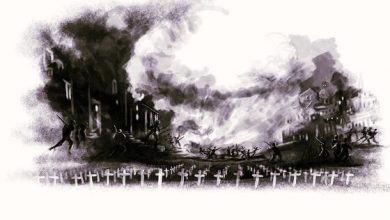The Friday Everything Changed by Anne Hart is a short feminist short story about gender discrimination and patriarchal oppression in a school. The story is narrated by an unnamed first-person narrator. Anne Hart is a Canadian author and librarian who is best known for her biographies, most notably those of Agatha Christie characters like Jane Marple and Hercule Poirot.
The Friday Everything Changed | Summary
Traditionally, in the narrator’s school, it had only been the boys who had carried the bucket of water. Until that day when the girls challenged that tradition, changing everything. The last hour of Friday afternoons was reserved for the Junior Red Cross when the older students would struggle to find the most interesting magazines. Physically stronger, the boys always got the National Geographics, getting to stare at scantily dressed African women, while the girls had to make do with the Junior Red Cross news that only featured African children. Apart from these occurrences, only one thing of note happened in this class – the selection of the two boys who would carry the water next week.
In the school, the rule for drinking water was that the student had to go up to the teacher’s desk behind which the bucket is kept, and drink the water from a paper cup. It was an interesting experience because “you could get just a glimpse of an idea of what the teacher thought she was all about.” The water for the school came from a railway station pump that was half a mile away. Once a health inspector visited the school and mandated the presence of drinkable water on campus. Although there were talks of digging a well for some time, in the end, a bucket was provided for the purpose of water being carried to the school from the railway pump.
And “for all the boys-the most important thing that happened at school, even more important than softball, was who would get to carry the water.” It was a symbol of their physical strength and masculinity, and boys started dreaming about it from as early as Grade 1. It was also a way to get away from school for half an hour but most importantly, it was the only real, tangible thing that the boys had. So, every Friday everybody would wait eagerly for the announcement of the two selected boys, until that one Friday when the teacher picks Ernie Chapman and Garnet Dixon, and Alma Niles, the narrator’s seatmate, asks –
“Why can’t girls go for the water, too?”
The class teacher, Miss Ralston, came from River Hibbert in Nova Scotia and was well-liked by her students. She was strict but not mean like some other teachers. Being quite young, she had trouble managing the bigger boys in her first week but being pretty big and tough herself, she had tamed all of them in front of the class. The boys had a grudging respect for Miss Ralston for being tough with them, and the girls liked her because she was very pretty and wore “nylon stockings and loafers” all the time.
“But the really unusual thing about Miss Ralston was the way she sometimes stopped in the middle of a lesson and looked at us as if we were real people, instead of just a lot of kids who had to be pushed through to their next grades.”
Hence, when Alma asks the question, instead of dismissing her straightaway, she promises to think about it. However, trouble starts as soon as they are outside the class “because all the boys knew, from the moment Miss Ralston had spoken, that something of theirs was being threatened and that”, and resolved to do everything in their power to stop a girl from carrying the bucket. They attempt to beat Alma up but in another surprising move, all the girls unite and shield her from harm, instead of just watching her get beaten up like they ordinarily would have done.
From the next week, the boys stopped letting girls field in softball games. The game was already overwhelmingly male-dominated as girls only got a chance to field and never to bat, and that too as “permanent supplementary fielders” and not the main ones. Their version of softball had strange rules which they only discovered later with the arrival of the television. Despite the discrimination, softball was an exciting venture for both girls and boys, so the exclusion was difficult to endure.
The girls cluster forlornly, and Minnie Halliday expresses her regrets over Alma’s demand, wishing that she had just let things be the way they are. It is a difficult moment for the girls as they know that they will be individually bullied by the boys if they dare to enter the field, and none of them own a bat or a ball to be able to play it on their own. However, Doris Pomeroy, older and braver than most of them, tells them to be patient. She is smart enough to know that the boys need them as fielders, and enjoy having girls around to watch them when they bat. She manages to keep the girls motivated to not break their ranks. However, it is still a long, hard week, with the boys trying to isolate and bully the girls individually, hoping that they would be scared and go to Miss Ralston to tell her that they have changed their minds. However, all this bullying does is keep the girls united, and bring them closer, letting them experience judgment-free female friendship for the first time, without the fear of getting laughed at.
Alma has it harder than all the others, receiving threatening notes from the boys all week. But her hardest test is when her cousin Arnold comes to convince her to give up the idea. He reveals to her that carrying the water isn’t all fun and games, and the girls are better off inside the warmth of the school, not having to carry the water in the freezing winters. However, Alma, who is used to listening to Arnold’s opinion on most things, stays firm, refusing to let cold winters scare her off.
Miss Ralston shows no sign of knowing that something is going on in school, to nobody’s surprise. Her punishments for pranks and threatening notes are no different from before, neither is her reaction to Alma’s “white face”. However, only Doris Pomeroy notices that Miss Ralston looks “real mad”. She tells them that their teacher had seen the girls hanging out around the door like “scared chickens”, and “rings that old handbell as if she wished all those yelling boy’s heads were under it.” Doris knows that Miss Ralston comes from a place where both boys and girls play softball together.
At the end of the week when the boys are playing softball at lunch, suddenly, Miss Rolston walks into the field and grabs the bat from Irving Snell, taking her students completely by surprise. She calls the pitcher, Ernie Chapman, forward to pitch. The first ball is wobbly and Miss Rolston is in danger of getting caught, but the ball slips from between the fielder’s fingers, relieving the girls who are cheering for their teacher with all their hearts. Ernie’s second pitch is well-considered as he is being cheered on by the other boys who encourage him to “Get her!”. The ball hits the bat and flies to the ox pasture outside the school compound, and we are told that “Hitting the ball into the ox pasture happened maybe once a year.” This is the first victory for the girls. In the afternoon, after Junior Red Cross, Miss Ralston announces that the two students selected for carrying the water this week are Alma Niles and Joyce Shipley.
The Friday Everything Changed | Analysis
The story depicts a school that is almost a microcosm of the patriarchal society outside. The boys have access to the jobs that they desire, much like men in the world, and the girls sit around at the mercy of the boys to let them in the few and only pleasures of life, like playing softball. Even here, the boys rule, and the girls are permanent fielders who are never allowed to bat, the best job is reserved for the boys alone.
Carrying the bucket of water is important for the students as it is the only “real” thing that they have that is not related to words printed on paper and directly affects the well-being of their classmates. It is not only a position of responsibility but also a way of showing leadership and physical superiority, both markers of traditional masculinity and thus important to the boys. For the girls, it represents their chance to prove that they are no less capable of responsibility and leadership than their male peers and to have something “real” for themselves too.
To nobody’s surprise, Alma’s question threatens the boys’ unchallenged assertion of ownership of the sole position of any responsibility in school, and they leave no stone unturned to prevent this from happening, attempting everything from threats, bullying, social exclusion, and physical assault by trying to beat up Alma. This exposes the true, violent face of patriarchy and for the first time, the girls experience female solidarity and friendship, which is impossible in a patriarchal space that inherently functions by creating discord between women so as to keep them from taking a united stand.
Miss Ralston becomes the moderator and the agent of change in this deadlock. Not only is she a capable and confident woman who is sure of her abilities, but she is also a good teacher who treats her students like humans and not mere mindless kids, earning even the respect of her male students. For the girls, she is a role model as she uses her position of authority not only to bring about greater gender equality in the school but also to keep the boys’ masculine arrogance in check after challenging them to a game of softball and literally hitting the ball off the park, a feat that is exceptionally rare even for the boys. She thus functions as the feminist prototype of a progressive, assertive, and capable woman who helps other oppressed women stand up for themselves.
The story, thus, depicts the power of female unity and solidarity in resisting and upturning patriarchal oppression and gender discrimination.
The Friday Everything Changed | Themes
Patriarchy – The story is set on a patriarchal premise where the male students of the school have greater privileges than females, and actively oppress them.
Sexism – The traditions of the school are primarily sexist, like only letting boys carry the bucket, and most teachers mirror this attitude, as do the students. Girls are threatened and bullied by boys regularly and are only included in games and social activities at the mercy of their male classmates.
Challenging Patriarchy through Female Solidarity – The central message of the story is that patriarchy can successfully be challenged and upturned when women forget their differences and help each other, acting as a united front. In the story, the constant acts of persecution by the boys backfire on them as it keeps the girls united, and students like Doris Pomeroy know the importance of this solidarity.
The Friday Everything Changed | Characters
Alma Niles – Although timid and naturally submissive, Alma is the first girl who questions the sexist tradition of only letting boys carry the water. Despite her instincts, she refrains from giving in to the collective threats of violence by the boys or to the persuasions of her cousin, showing admirable courage and strength of character.
Miss Ralston – The ideal class teacher and feminist prototype, Miss Ralston is a strong, charismatic, and confident woman who is enraged by the patriarchal culture of the school. However, she knows better than handing out difficult punishments to boys for their behavior, realizing that this will only serve to heighten their arrogance and superiority complex and give them a chance to show off their masculinity by not breaking under hard punishments. She challenges them to softball knowing that a woman beating them at their woman would be a humiliation that is necessary to inculcate in them values like gender equality and respecting women.
Doris Pomeroy – Older than the narrator and Alma, she is smart, courageous, and observant, knowing full well that the only way to counter sexism is for the girls to unite, and it is her words that keep them from falling apart after they are excluded from softball. She is also observant enough to notice Miss Ralston’s anger at the boys’ behavior when nobody else does, making her a good judge of character.




